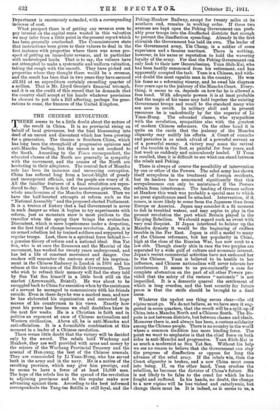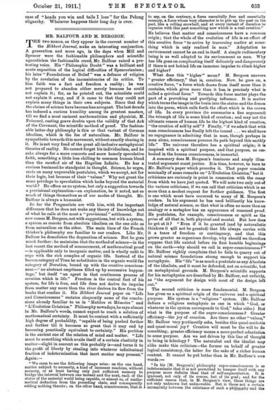THE CHINESE REVOLUTION. T HERE seems to be a little doubt
about the nature of the revolt in China. It is no provincial rising on behalf of local grievances, but the final blossoming into deed of an unrest and discontent which has been growing for a generation. The theatre is Southern China, which has long been the stronghold of progressive opinions and anti-Manchu feeling, but the unrest is not confined to the South. According to the Times correspondent, the educated classes of the North are generally, in sympathy with the movement, and the armies of the North are hesitating in their allegiance. The central fact of Manchu rule has been its immense and unvarying corruption. China has suffered long from a locust-blight of greedy and incompetent officials, and the people are weary of it. All the familiar features of a final revolution are repro- duced to-day. There is first the monstrous grievance, the whole anachronism of the Manchu Government. Then we have the half-hearted attempts at reform such as the " National Assembly " and the proposed elected Parliament. It is a truism of history that a bad Government is never in such danger as when it begins to try experiments with reform, just as mountain snow is most perilous to the traveller when the spring thaw brings the avalanches. Discontent, which is mere hopelessness under a despotism, on the first hint of change becomes revolution. Again, it is an armed rebellion led by trained soldiers and supported by regular troops. Last, there is a spiritual force behind it— a genuine theory of reform and a national ideal. Sun Yat Sen, who is at once the Rousseau and the Mazzini of the movement, has worked for twenty years underground, and has led a life of constant movement and danger. Our readers will remember the curious story of his imprison- ment in the Chinese Embassy in London in 1896 and his release at the instance of the British Government. Those who wish to refresh their memory will find the story told by Sun Yat Sen himself in a little book still on the market (Arrowsmith, Bristol). He was about to be smuggled back to China for execution when by the assistance of a servant he managed to communicate with his friends outside. Even in these days he was a marked man, and now he has elaborated his organization and converted huge masses of his countrymen to his views. Exactly how great his power has become we shall doubtless know in the next few weeks. He is a Christian in faith and in politics an exponent at once of Chinese nationalism and Western civilization. Above all, he is anti-Manchu and anti-officialism. It is a formidable combination at this moment in a leader of a Chinese revolution.
There seems little doubt that the victory will be decided only by the sword. The rebels hold Wuehang and Hankow, they are well provided with arms and money by the seizure of the Wuchang Provincial Treasury and the arsenal of Han-yang, the best of the Chinese arsenals. They are commanded by Li Yuan-Hung, who has served both in the army and in the navy. He is a native of the revolting province, which may give him prestige, and he seems to have a force of at least 15,000 men. The hope of the rebels lies in the spread of the revolution to adjoining provinces and to the regular ranks now advancing against them. According to the best informed correspondents the Yang-tee flotilla is still loyal, and the Peking-Hankow Railway, except for twenty miles at its southern end, remains in working order. If these two avenues are kept open the Peking Government can prob- ably pour troops into the disaffected districts fast enough to prevent the disaffection spreading. Already In the first skirmish the Government has held its own. The leader of the Government army, Yin Chang, is a soldier of some experience and a famous martinet. There is nothing, however, in his name or reputation to hold the wavering loyalty of the army. For that the Peking Government can only look to their new Generalissimo, Yuan Shih-Kai, who has been hastily summoned from his retirement, and has apparently accepted the task. Yuan is a Chinese, and with- out doubt the most capable man in the country. He won his fame as a reforming viceroy, and he owed his disgrace four years ago to the jealousy of the Manchu Court. Every- thing, it seems to us, depends on how far he is allowed a free hand. With adequate powers it is at least probable that the magic of his name may hold together the existing Government troops and recall to the standard many who are now in revolt. In military skill and in present resources he is undoubtedly by far the superior of Li Yuan-Hung. The educated classes, who sympathize with the revolution, sympathize also with the greatest of modern Chinese reformers. On the other hand it is quite on the cards that the jealousy of the Manchu oligarchy may nullify his efforts. A Court of eunuchs and parasites is as much afraid of a. powerful servant as of a powerful enemy. A victory may mean the revival of the trouble in the foot, so painful for four years, and last week so suddenly and miraculously healed. If Yuan is recalled, then it is difficult to see what can stand between the rebels and Peking.
There is always of course the possibility of intervention by one or other of the Powers. The rebel army has shown itself scrupulous in the treatment of foreign residents, but its leaders have announced significantly that this scrupulousness can only be maintained if the Powers ieflain from interference. The landing of German sailors at Hankow this week was probably a special case to which no great significance need be attached. Intervention, if it, comes, is more likely to come from the Japanese than from Europe or America. Japan may consider it a fit moment to fish in troubled waters, and may aspire to play in the present revolution the part which Britain played in the Tai-ping Rebellion. We should regard such an event with very real disquiet. If Japan interfered to bolster up the Manchu dynasty it would be the beginning of endless trouble in the Far East. Japan is still a model to many of the Chinese reformers, but her popularity in China, high at the close of the Russian War, has now sunk to a low ebb. Though closely akin in race the two peoples are separated by a wide gulf of culture and economic interest. Japan's recent commercial activities have not endeared her to the Chinese. Yuan is believed to be hostile to her influence, and Chinese nationalism will never tolerate her interference. It seems to us pre-eminently a case for complete abstention on the part of all other Powers pro- vided that the safety of the various " nationals " is not imperilled. It is a domestic quarrel the settlement of which is long overdue, and the best security for future peace is that the strife should be brought to a final issue.
Whatever the upshot one thing seems clear—the old regime must go. We do not believe, as we have seen it sug- gested in some quarters, that the result will be a split-up of China into a Manchu North and a Chinese South. The dis- pute is not between districts, but between classes and ideals. Moreover there is, and always has been, a curious solidarity among the Chinese people. There is no country in the world where a common tradition has more binding force. The point we want to emphasize is that the chief force on both sides is anti-Manchu and progressive. Yuan S hih-Kai is as much a modernist as Sun Yat Sen. Without his help we see no reason to believe that the Government can stay the progress of disaffection or oppose for long the advance of the rebel army. If the rebels win, then the Court oligarchy is broken, and a new China, must come into being. If, on the other hand, Yuan crushes the rebellion, he becomes the dictator of China's future. He is not likely to be false to the creed for which he has fought and suffered. In his hands, no doubt, the change to a new regime will be less violent and cataclysmic, but change there must be. It is indeed, as it seems to us, a case of " heads you win and tails I lose " for the Peking oligarchy. Whatever happens their long day is over.















































 Previous page
Previous page